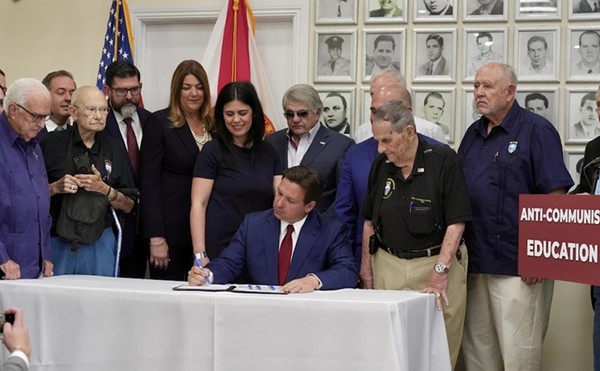Jim Turner has a top rating from Martindale-Hubbell, a peer-review group for lawyers, and volunteers with the Coalition for the Homeless of Central Florida. Fred Schott also has a top Martindale-Hubbell rating, and he works with Harbor House, a charity for abused women and their children.
One of these men will be the next Orange-Osceola County Circuit Court judge. On Nov. 4, you'll get to choose which one. Chances are, though, you don't know anything about them. And, as silly as it sounds, Turner is probably the front-runner because he shares a name with a popular local AM radio talk-show host. In fact, an August 2008 article in the American Bar Association Journal illustrates how, depending on the part of the country in which a candidate is running, names mean everything: In Chicago, candidates with Irish-sounding names perform well; in Manhattan, Jewish women tend to win.
In this race, ethnic considerations aren't at play. But the fate of this election is still all in a name.
"Honestly, I think `victory is` determined by name recognition," says Schott, whose logo includes a basketball going through a hoop. Asked how he can boost his name recognition or draw distinctions between himself and Turner, he admits, "I'm still trying to figure out the science of that. The vast `majority` of people aren't going to care about judicial elections."
In the August primary, Turner and Schott edged out lawyer John Crotty — who spent less than $8,000 on his campaign, compared to Schott's nearly $284,000 and Turner's $87,000, yet still took 29 percent of the vote — to earn their place on the November ballot, finishing less than 1,000 votes apart out of 92,000. In the interest of full disclosure, this reporter — who considers himself fairly informed on most civic matters — did in fact vote in this race, but does not recall for whom. I Christmas—treed the races for which I didn't have any informed judgment. I do remember voting for Brad Conway in a county judge race (he lost) because his last name is also the name of the street on which I live.
That reality is that judicial voting is something of a guessing game for most of us. We're not lawyers, and unless you know these people personally, it's hard to tell whether or not they'd make good judges. You can't base your vote on their party, because these are nonpartisan elections. And you can't base your vote on their promises, because by the rules of the Florida Bar, they can't make promises about how they would rule.
In fact, Canon 7 of the Florida Bar's rules on judicial conduct states unequivocally that judicial candidates should not "make pledges or promises of conduct in office other than the faithful and impartial performance of the duties of their office" or "make statements that commit or appear to commit the candidate with respect to cases, controversies or issues that are likely to come before the court."
The idea is to keep politics out of the judiciary. In practice, however, voters have little idea what they're getting. And currently, that situation is the subject of a federal lawsuit.
In 2006, the Florida Family Policy Council, a right-wing organization tied to James Dobson, sent questionnaires to judicial candidates all across the state; most didn't reply, and many who did told the group that the Florida Bar forbade them from saying anything meaningful. The issue isn't necessarily one of free speech: The U.S. Supreme Court long ago struck down restrictions on what judges could say. Rather, the Florida Bar prevents candidates from issuing opinions on specific issues that might come before them as judges. If something they'd commented on did come up, they would have to recuse themselves. So the Florida Family Policy Council filed a federal lawsuit.
(In September 2007, a federal court dismissed the FFPC's lawsuit, but the organization appealed its case to the federal 11th Circuit Court of Appeals in May.)
Under the current system, judicial candidates such as Turner and Schott are hard-pressed to define themselves, and that leaves their candidacies subject to the whims of chance. In the primary, even the Orlando Sentinel editorial board declined to issue an endorsement; Schott says they canceled the candidates' interviews (though the paper did publish a generic three-question Q&A). Their websites don't relay much beyond their résumés and civic volunteerism. At the end of the day, they're two white male lawyers who both seem well-qualified, at least on paper, and have a track record of community service.
So how are voters to choose? "I have 10 more years of experience," Turner says. "I'm a veteran. I have more legal experience, more life experience than he does. I have significantly more experience in court than he does." (Schott disputes that, saying he's been through more trials and appeals.)
Much of that experience gap can be attributed to age; Turner, 62, has 14 years on his competitor. Schott's campaign, meanwhile, touts endorsements from such groups as the Fraternal Order of Police and the Florida AFL-CIO.
"I'm going to be a very different kind of judge around here," Schott says. His passion, he says, is for juvenile justice, and he thinks it's a circuit judge's responsibility to be out in the community, working with groups that try to prevent juvenile crime.
Also, Schott points to the Sentinel questionnaire, in which Turner wrote, "I am not aware of any failings on the Ninth Circuit Court bench." Schott says there are in fact problems, particularly with budget cuts that are getting in the way of the judges' business.
None of that stuff tells you which one would make the better judge. Nor does it tell you much about their general outlooks on the law, crime and punishment or family matters — the kind of things they'll have to decide. For voters, this paradigm leaves us to guess, or flip a coin, or simply skip that part of the ballot altogether.
That's enough to make you wonder if there's not a better way of selecting judges. Florida, like most states, has at least some judicial elections, and in a few states, these elections can be hyper-partisan — Florida's are nonpartisan — and fueled by special interests trying to get a leg up on the third branch of government.
At least one state, Arizona, does it differently, and its system has no less an advocate than former U.S. Supreme Court Justice Sandra Day O'Conner, who in May openly lobbied for a national change toward her home state's method. In Arizona, a panel of non-lawyers suggests the names of potential judges to the governor, who chooses one. After that, those judges must run in retention elections; if they don't perform well, voters can kick them out, but they don't have to run in nasty, expensive campaigns either.
Such a system has its own pitfalls — governors would have even more power to mold a state's courts, for instance — but at least voters wouldn't be voting blindly on candidates they know nothing about.
[email protected]

















